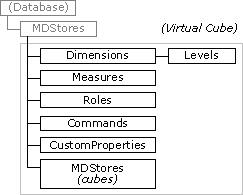
Virtual cubes join cubes in a manner conceptually similar to the way relational views join tables. Virtual cubes contain these collections: Dimensions and their subordinate Levels collection, Measures, Roles, Commands, CustomProperties, and an MDStores collection. The MDStores collection of a virtual cube contains the cubes that supply information to be included in the virtual cube.
A virtual cube is a special case of a cube and is like a cube in many ways. Virtual cubes have the same collections as cubes except that virtual cubes do not have a Datasources collection, and a virtual cube’s MDStores collection contains cubes whereas a cube’s MDStores collection contains partitions. A virtual cube object has its SubClassType property set to sbclsVirtual, in contrast to sbclsRegular for regular cubes.

A virtual cube is restricted in that all of its dimensions or measures must be present in one or more of the underlying cubes. Like cubes, a virtual cube’s roles must come from its parent database. You can use a role on a virtual cube to expose data from underlying cubes to users who do not have permission to read data from the underlying cubes.
The Dimensions collection in a virtual cube contains the definitions of the dimensions used by the virtual cube. These dimensions must exist in at least one of the cubes that make up the virtual cube.
The Measures collection in a virtual cube contains the measures associated with the virtual cube. These measures must exist in at least one of the cubes that make up the virtual cube.
The Roles collection in a virtual cube contains access rights to the virtual cube definition. Only roles that are contained in a virtual cube’s parent database can be assigned to the virtual cube.
The Commands collection in a virtual cube contains MDX expressions that are used to specify the data to be used in the virtual cube.
The CustomProperties collection contains Property objects that you can use to define additional properties for your own purposes.
The MDStores collection in a virtual cube contains one or more cubes.
| Cubes | Databases |